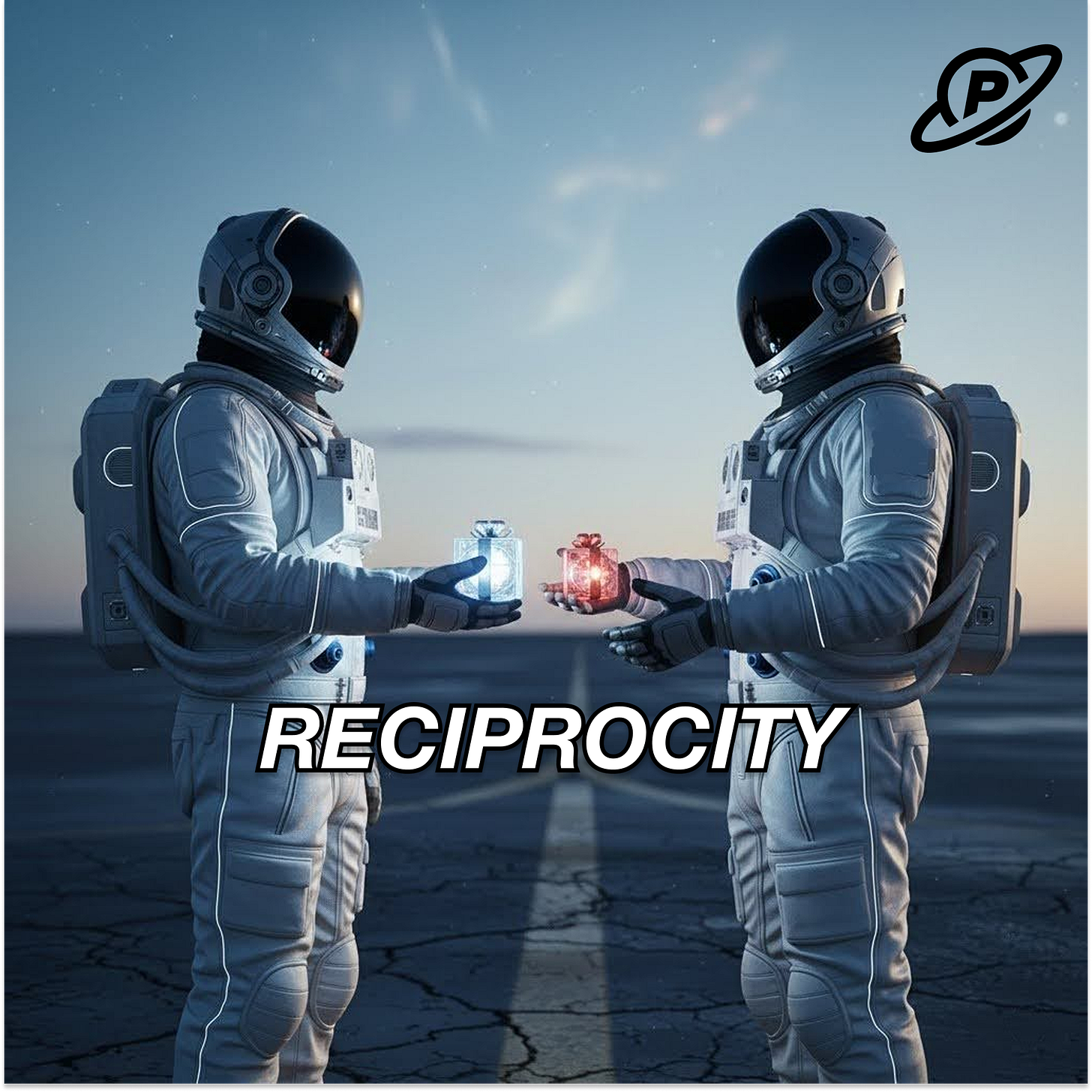Reciprocity - Mental Model
Real-world karma: spreading good will bring you good.
Certain groups of people are masters of human interactions. As an engineer, it was something I always struggled with. But when I started to perceive the way they interact with people as a game of give and take, playing it became enjoyable.
Reciprocity is hidden in Newton's third law, where for each action you get an equal and the directionally opposite reaction.
Physical forces are simultaneous and mechanical, while social reciprocity is sequential and psychological. There are timeless skills that AI won't replace, and one of them is interacting with people.
Sharing with others and helping people within our tribe was promoted behaviour. Tribes that helped each other had a higher survival rate.
Winning Strategies
The evolutionary hypothesis may support why it's deeply embedded in our default behaviour. But game theory explains why it's just a better strategy.
The Prisoner's Dilemma, which is a thought experiment, illustrates people's self-interest over cooperation:
There are two players. They can choose to cooperate or betray, to earn points (think of these points as success or profit). They don't know their decisions. When they cooperate, they both win 10 points, but when they both betray, they get 0. When one cooperates but the second betrays, the deceiving one gets 40 points.
Betraying seems smart as you can get much more points. But in life, we work with the same people. When someone betrays you, you'll likely betray them back. Then both players end up with 0 points, forever.
The optimal strategy was calculated in the 1980s during Robert Axelrod's tournament when he invited different game theory experts:
The winning strategy is called "Tit for Tat":
Be nice first — start by cooperating
Copy whatever the other player did in their previous round
Forgive — if they didn't cooperate in the previous round, if they cooperate again, do it too (it might have been a mistake: Hanlon's Razor)
It has been proved mathematically that reciprocity gets both players the highest score.
Teams Context
Reciprocity inside an organisation is optimal for its proper functioning, encouraging cooperation, which helps companies survive similarly as it helped the human species survive.
Mentoring is a great example of beneficial behaviour. When we teach others, we help ourselves establish our knowledge, and our mentees benefit from it too.
Helping others may seem like a sacrifice of your own time, but it's not. Adam Grant, in his “Give and Take” book, emphasised that Givers represented the most productive group at the company, even though intuitively they are spending less time doing their own work.
As a manager, I often helped other teams when they needed support. Later, it made it easier to get help for my own team — like getting budgets approved, fixing support tickets, or solving problems between teams.
Potential Warning
Reciprocity is a deeply rooted mechanism for us interacting with others, but there's a darker side — it can be used to influence us.
What to do when people are asking for a favour — when we agree to do something for others, they might feel obliged to do something for us, or we may feel that we'll get something back. That's why every potential gift of compliment may unknowingly change our perception to give it back at some point.
"Door in the face" is a method of convincing people to agree to a favour, first by asking for something that requires a huge effort, but then lowering the stakes and proposing something minor. Participants agreed as they wanted to reciprocate the ask (it’s more effective due to the contrast principle, two tasks were compared)
An experiment done by Robert Cialdini, author of "Influence: The Psychology of Persuasion”:
Researchers asked students to take care of their younger colleagues for 2 hours (a small request), but only 16.7% agreed.
Researchers asked students to volunteer in a juvenile detention centre for two hours per week for a length of two years (an extensive request), but then they asked if they could take care of their younger colleagues for 2 hours (a small request), and almost 50% agreed.
Framing requests like this may help you convince your team to agree to help, but you may also agree more often when presented with a similar proposition.
Summary
When you help, you don't lose much. You may receive it back in return someday, but if not, keep helping — It’s the optimal strategy.
As an engineering manager, I spent countless hours with work that I didn't have to do, but someone needed help with. I'm never sure if it's a genuine need to help or a high drive to solve problems.
Thanks for reading!
— Michał
Post Notes
Discover Weekly — Shoutouts
Articles that might help you explore new perspectives, which I’ve read recently:
Connect
LinkedIn | Substack DM | Mentoring | X | Bsky



